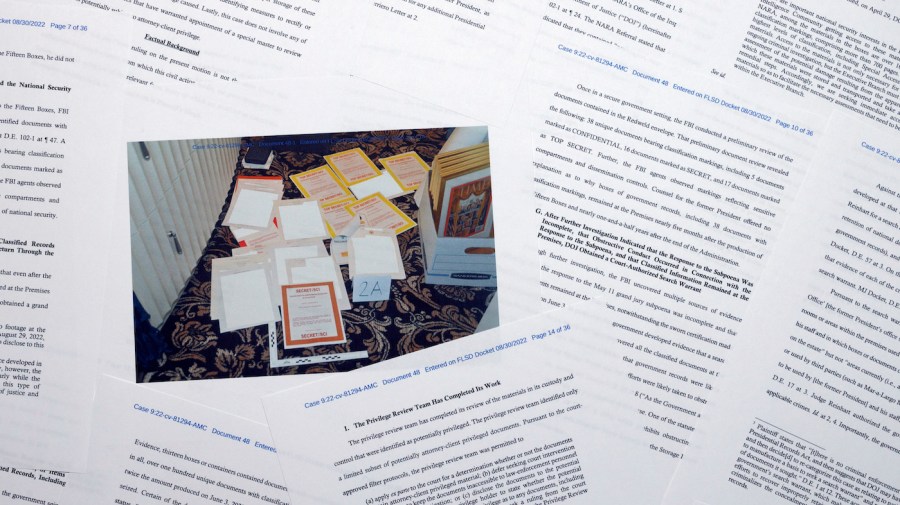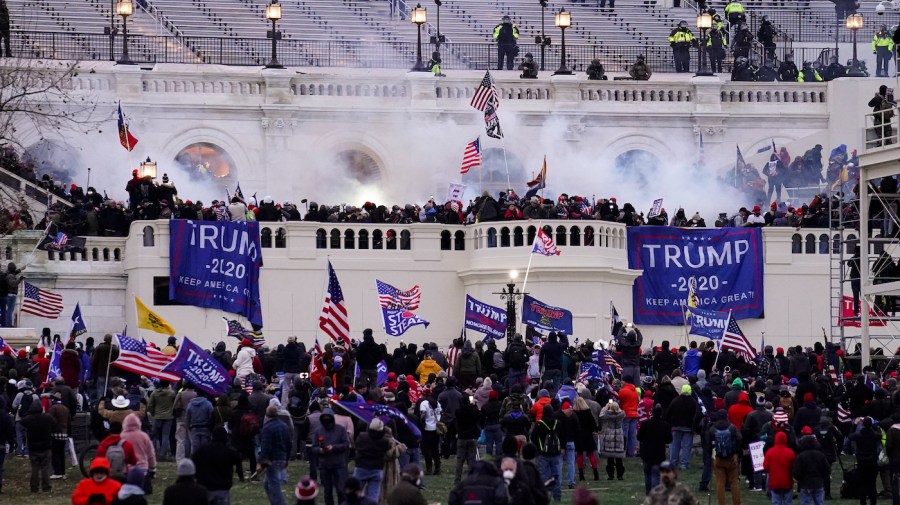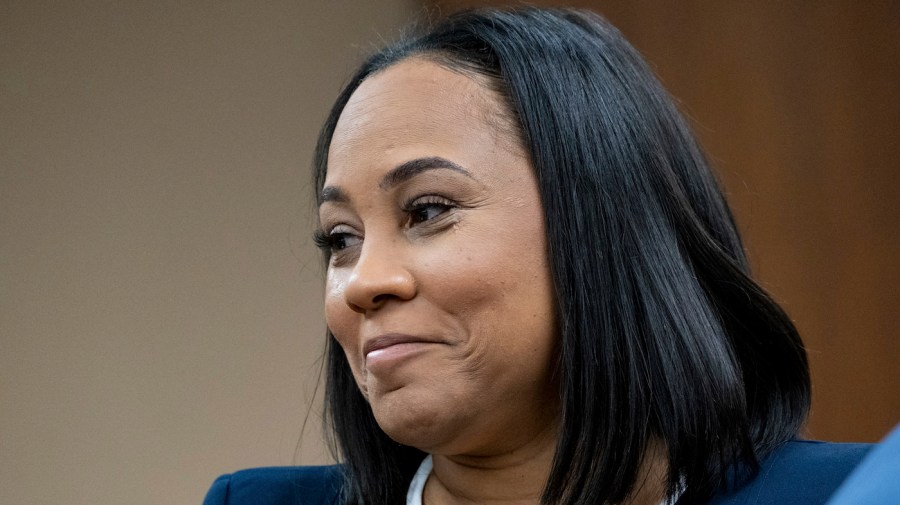Here’s where three criminal probes stand as Trump enters 2024 race
Former President Trump entered the 2024 presidential race Tuesday with significant legal baggage.
Though he hasn’t been charged with any crimes, Trump faces exposure from multiple probes that are expected to ramp up now that investigators’ self-imposed hiatus on overt activity ahead of the midterms has been replaced with pressure to file any charges well in advance of the 2024 election.
The first indictment of a former president would not bar Trump from running for reelection. But such a historic move would almost certainly destabilize the country and deepen emerging divisions within the Republican Party as primary election season draws nearer.
Here’s where three investigations surrounding Trump currently stand.
DOJ probe of classified document handling: Pace expected to intensify

Pages from a DOJ court filing on Aug. 30, 2022, in response to a request from the legal team of former President Donald Trump for a special master to review the documents seized during the Aug. 8 search of Mar-a-Lago, are photographed on Aug. 31, 2022. Included in the filing was a FBI photo of documents that were seized during the search.
The Department of Justice (DOJ) probe into Trump’s potentially unlawful retention of classified records after leaving the White House could soon ramp up significantly.
Some legal experts believe that, based on what’s publicly known, there is enough evidence to pursue charges against Trump for mishandling national defense information. The recent addition of two high-profile veteran prosecutors to the investigative team could also indicate an uptick in tempo.
What began with the National Archives asking Trump last year to return all presidential records has since spiraled into a tense legal standoff. In January, Trump returned 15 boxes of records, which were later discovered to contain around 100 classified documents, including highly sensitive materials.
The FBI later concluded that more classified records remained at the former president’s Florida home and obtained a warrant to search Mar-a-Lago. Investigators seized some 11,000 additional documents, which included more than 100 records marked as classified.
Both Trump and top aide Kash Patel have said publicly that the former president declassified the records housed at Mar-a-Lago, though Trump’s lawyers have stopped short of making this assertion in court filings.
Patel has reportedly faced questioning at least twice before a grand jury investigating Trump’s possible mishandling of classified documents. According to reports, Patel initially asserted his Fifth Amendment right against self-incrimination before prosecutors granted Patel limited immunity to shield him from liability for anything said before the grand jury.
Meanwhile, the case has become bogged down in legal skirmishing. In August, a Trump-appointed judge in Florida granted the former president’s request to subject the documents seized at Mar-a-Lago to further judicial scrutiny.
Judge Aileen Cannon agreed to appoint a third-party monitor to the case known as “special master,” who is charged with reviewing the records. The special master, Judge Raymond Dearie, will make a recommendation to Cannon over whether the records at issue belong to Trump or the government, and if any are subject to executive or attorney-client privilege.
The Department of Justice, for its part, has urged the court to broadly reject Trump’s sweeping claims regarding his possession of the records and their privileged status. The department has also appealed the appointment of a special master, with a hearing in the case scheduled for Tuesday.
In addition to the obvious political sensitivities surrounding the decision over whether to charge Trump, other rare challenges exist too.
The highly sensitive nature of the records at issue — including classified materials that reportedly relate to Iran’s missile system and China — means the DOJ would have to get the intelligence community’s permission to use those records in their prosecution of Trump.
“To use classified documents in a criminal case, the originator of the material would need to sign off. Usually, that means declassification,” said Barbara McQuade, a former federal prosecutor who teaches law at the University of Michigan Law School.
“If these documents are as sensitive as they have been reported to be, then members of the intelligence community will not approve their use. It may be that an eventual trial includes only a subset of the classified documents,” she added. “For criminal cases, prosecutors look for what they refer to as ‘Goldilocks’ documents, those that are neither too sensitive nor too insignificant.”
DOJ investigation of Jan. 6 attack: Scope has extended to Trump’s orbit

Violent insurrectionists storm the Capitol on Jan. 6, 2021, in Washington.
The DOJ is also probing Trump’s actions surrounding the Jan. 6, 2021, attack at the Capitol, though this investigation has been largely overshadowed by the Trump classified records case.
The Jan. 6 investigation has steadily expanded over the nearly two years since the attack. In addition to charging some 950 people with crimes related to the Jan. 6 riot, the department’s probe now extends to members of Trump’s orbit and the former president’s own actions — though there is no public evidence that Trump is currently the subject of a criminal investigation on this front.
The grand jury investigating Jan. 6 has approved subpoenas for information on any coordination between Trump, his lawyers, senior officials and others in his orbit who helped to operationalize the Trump’s lies about his 2020 electoral defeat in a bid block the transfer of power to then President-elect Joe Biden.
According to The Washington Post, which first reported in July that Trump’s actions figured into the DOJ’s investigation, prosecutors have asked witnesses about post-election meetings involving Trump, the phony pro-Trump electors scheme and pressure on then-Vice President Mike Pence to overturn Biden’s victory.
This summer, before the probe went quiet in September due to the approaching Nov. 8 midterms, investigators issued a flurry of subpoenas, conducted searches and seized the cellphones of top Trump allies.
High-profile investigative steps included a search in June of the home belonging to Jeffrey Clark, a former DOJ official who allegedly sought to use his official government position to overturn Trump’s election defeat in key battleground states. At one point after the election, Trump sought to install Clark as acting attorney general but was dissuaded from doing so after top department officials threatened to resign en masse.
Investigators in June also seized the cellphone of John Eastman, who authored fringe legal memos for the Trump campaign arguing that then-Vice President Mike Pence was authorized to unilaterally refuse to certify Biden’s win in the 2020 presidential election.
In a separate development, a federal judge in California who reviewed the evidence in a related lawsuit determined earlier this year it was “more likely than not” that the post-election conduct by Trump and Eastman was criminal.
The determination by U.S. District Judge David Carter, an appointee of former President Clinton, arose in a clash between Eastman and the House committee investigating Jan. 6 over a subpoena the panel issued for a trove of Eastman’s records. As such, the judge’s analysis in the case has no direct bearing on whether Trump will face criminal charges.
But it was nonetheless stunning for a federal court to find Trump likely culpable for two felonies: obstructing an official government proceeding, a serious charge that has been brought against hundreds of Capitol riot defendants, and conspiracy to defraud the United States. Last month, the judge further determined that Trump had made sworn statements in court filings and in public that he knew were false as part of his effort to overturn the election results in Georgia.
For now, the DOJ is reportedly locked in a court battle over whether two attorneys who served as White House counsel — Patrick Philbin and Pat Cipollone — can be compelled to testify over objections from Trump’s lawyers, citing executive and attorney-client privilege.
Investigation of Georgia election interference: Charges could arrive before year’s end

Fulton County District Attorney Fani Willis watches as potential jurors are excused during proceedings to seat a special purpose grand jury in Fulton County, Georgia, on May 2, 2022, to look into the actions of former President Donald Trump and his supporters who tried to overturn the results of the 2020 election.
An Atlanta-area prosecutor’s investigation into Trump’s effort to overturn his 2020 electoral defeat in Georgia represents significant legal exposure for the former president, legal experts say.
Decisions over whether to bring charges in the case may come before the end of the year, according to previous statements by Fulton County District Attorney Fani Willis (D) and recent reporting on her office’s anticipated timeline.
Willis has issued numerous subpoenas for testimony before a special grand jury that was impaneled earlier this year to investigate the potentially criminal effort to disrupt the Georgia election.
Among the high-profile Trump allies who have received subpoenas are former White House chief of staff Mark Meadows, former lawyer Rudy Giuliani and other pro-Trump attorneys, and Sen. Lindsey Graham (R-S.C.), the latter of whom is expected to face questions Tuesday before the grand jury.
In an aggressive move this summer, the district attorney’s office told a group of 16 Republicans who served as a phony slate of pro-Trump electors in 2020 that they could face criminal charges in the probe.
“The steps her office has taken, including empaneling a special grand jury and subpoenaing high-profile witnesses, are very likely not steps she would have taken if she did not feel there was at least a significant possibility that she will move forward with charges,” Noah Bookbinder, president of Citizens for Responsibility and Ethics in Washington (CREW), told The Hill in a previous interview.
A comprehensive analysis of the Georgia investigation published this week by the nonpartisan Brookings Institution, with members of CREW, concluded that Trump “is at substantial risk of criminal prosecution in Fulton County.”
Fulton County prosecutors announced the launch of a criminal investigation into 2020 election interference in February 2021, a month after Trump, in a taped phone call, unsuccessfully pressured Georgia election official to “find” the more than 11,000 votes required to overturn Biden’s victory and declare Trump the winner.
Copyright 2023 Nexstar Media Inc. All rights reserved. This material may not be published, broadcast, rewritten, or redistributed. Regular the hill posts







